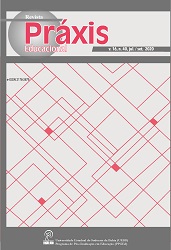CHILDREN’S SCHOOL, CITY AND DEMOCRACY: SEEKING THE EXERCISE OF CHILDREN’S CITIZENSHIP
DOI:
https://doi.org/10.22481/praxisedu.v16i40.6885Keywords:
City, Children’s citizenship, TerritoryAbstract
This article is a dialogue between perspectives that think about the education of children in articulation with the visibility and the guarantee of the right to the urban space of cities. This is a clipping of Canavieira's doctoral thesis (2019) that addresses democratic conceptions and practices in early childhood education. We start from the studies of Sennett (2016 and 2016), Lefebvre (2001), Lopes (2006 and 2018), with the main objective to highlight political-pedagogical conceptions and practices that catalyze the integration of babies and young children in through the institutions of early childhood education and the relationship between public and political space. We defend the possibilities of territorialization of children in the urban space as an exercise of democratic practice and citizenship and the power of early childhood education in this process, problematizing the elements of the process of deterritorialization of the child body in the public space. Therefore, we discuss the idea of educational territory coined in the reality of Paulistana Early Childhood Education. We argue that political- pedagogical intentionality based on democratic principles can guarantee young children the right to the city, and the formation of citizen bodies, minds and subjectivities.
Downloads
Metrics
References
COELHO, Polyana Pereira; GONÇALVES, Raquel Garcia. Ocupar a cidade, as ruas, as praças e os espaços: os limites da institucionalidade e as possibilidades de ação direta. Anais do XVII Encontro Nacional da Associação Nacional de Pós-Graduação e Pesquisa em Planejamento Urbano e Regional. São Paulo, 2017.
COUTINHO, Carlos Nelson. A democracia como valor universal e outros ensaios. 2. ed. Rio de Janeiro: Salamandra, 1984.
DAHL, Robert A. A democracia e seus críticos. São Paulo: WMF Martins Fontes, 2012.
SANTOS, Solange Estanislau dos; ANJOS, Cleriston Izidro dos; FARIA, Ana Lúcia Gourlart de. A criança das pesquisas, a criança nas pesquisas... A criança faz pesquisa?. Práxis Educacional, [S.l.], v. 13, n. 25, p. 158-175, abr. 2017. ISSN 2178-2679. Disponível em: <http://periodicos2.uesb.br/index.php/praxis/article/view/958>. Acesso em: 06 jun. 2020. doi: https://doi.org/10.22481/praxis.v13i25.958.
FREIRE, Paulo. A educação na cidade. São Paulo: Cortez, 1991.
GUATTARI, Félix; ROLNIK, Suely. Micropolítica: cartografias do desejo. 7. ed. Petrópolis: Vozes, 2005.
HAESBAERT, Rogério. BRUCE, Glauco. A desterritorialização na obra de Deleuze e Guattari. GEOgraphia, v.4, n.7, set. 2002. Disponível em: http://periodicos.uff.br/geographia/article/view/13419/8619 Acesso em 20 de out. de 2019.
LEFEBVRE, Henry. O direito à cidade. São Paulo: Centauro, 2001.
LOPES, Jader Janer Moreira. VASCONCELLOS, Tânia. Geografia da Infância: Territorialidades infantis. Currículo sem Fronteiras, v.6, n.1, pp.103-127, Jan/Jun 2006
LOPES, Jader Janer Moreira. FERNANDES, Maria Lidia Bueno. A criança e a cidade: contribuições da Geografia da Infância. Educação. (Porto Alegre), v. 41, n.2, p. 202-211, maio-ago. 2018.
MASSCHELEIN, J.; SIMONS, Maarten. A pedagogia, a democracia, a escola. Belo Horizonte: Autêntica, 2014.
MARSHALL, T. H. Cidadania, classe social e status. Rio de Janeiro: Zahar, 1967.
RANCIÈRE, Jacques. A partilha do sensível: estética e política. 2.ed. São Paulo: EXO experimental org.; Editora 34, 2009.
RANCIÈRE, Jacques. Nas margens do político. Lisboa (Portugal): KKYM, 2014.
RANCIÈRE, Jacques. O desentendimento: política e filosofia. São Paulo: Editora 34, 1996a.
RANCIÈRE, Jacques. O dissenso: a crise da razão. São Paulo: Companhia das Letras, 1996b.
ROLNIK, Raquel. São Paulo, territórios em disputa e os limites do planejamento. Entrevista, 2017. Disponível em: https://raquelrolnik.wordpress.com/tag/territorios-em-conflito/ Acesso em 20 de out. de 2019.
SÃO PAULO, Secretaria Municipal de Educação. Indicadores e qualidade da educação infantil paulistana. São Paulo: Diretoria de Orientações Técnicas/SME, 2016.
SAQUET, Marcos Aurélio. As diferentes abordagens do território e a apreensão do movimento e da (i)materialidade. Geosul, Florianópolis, v. 22, n. 43, p 55-76, jan./jun. 2007 Disponível em: https://periodicos.ufsc.br/index.php/geosul/article/viewFile/12646/11806 Acesso em 20 de out. de 2019.
SENNETT, Richard. Carne e pedra: o corpo e a cidade na civilização ocidental. 4.ed. Rio de Janeiro: BestBolso, 2016.
SENNETT, Richard. Construir e Habitar: ética para uma cidade aberta. Rio de Janeiro: Record, 2018.
SILVA NETO, Manoel Lemes da. (Coordenador) ARROYO, Mônica. (Debatedora). Território usado/praticado como categoria central do planejamento urbano regional. Sessão Livre. Anais do XVII Encontro Nacional da Associação Nacional de Pós-Graduação e Pesquisa em Planejamento Urbano e Regional. São Paulo, 2017.
SCHÉRER, René. Petit Alphabet Impertinent. Hermann Éditeurs: Paris, 2014.
SILVA, Luan do Carmo. Massey, Doreen. Pelo Espaço: uma nova política da espacialidade. (Resenha). Bol. geogr., Maringá, v. 34, n.2, p. 158-160, 2016.
SOUZA, Marcelo Lopes de. Do “direito à cidade” ao direito ao planeta: territórios dissidentes pelo mundo afora e seu significado na atual conjuntura. 2014 (Primeira parte) Texto disponibilizado no blog Passa Palavra: http://passapalavra.info/2014/07/97823/ Acesso em 20 de out. de 2019.
Downloads
Published
How to Cite
Issue
Section
License
You are free to:
Share - copy and redistribute the material in any medium or format; Adapt - remix, transform, and build from the material for any purpose, even commercially. This license is acceptable for Free Cultural Works. The licensor cannot revoke these freedoms as long as you follow the terms of the license.
Under the following terms:
Attribution - You must appropriately give credit, provide a link to the license, and indicate if any changes have been made. You may do so in any reasonable way, but not in a way that suggests that you or your use is endorsed by the licensor.
There are no additional restrictions - You cannot apply legal terms or technological measures that legally restrict others to make any use permitted by the license.










